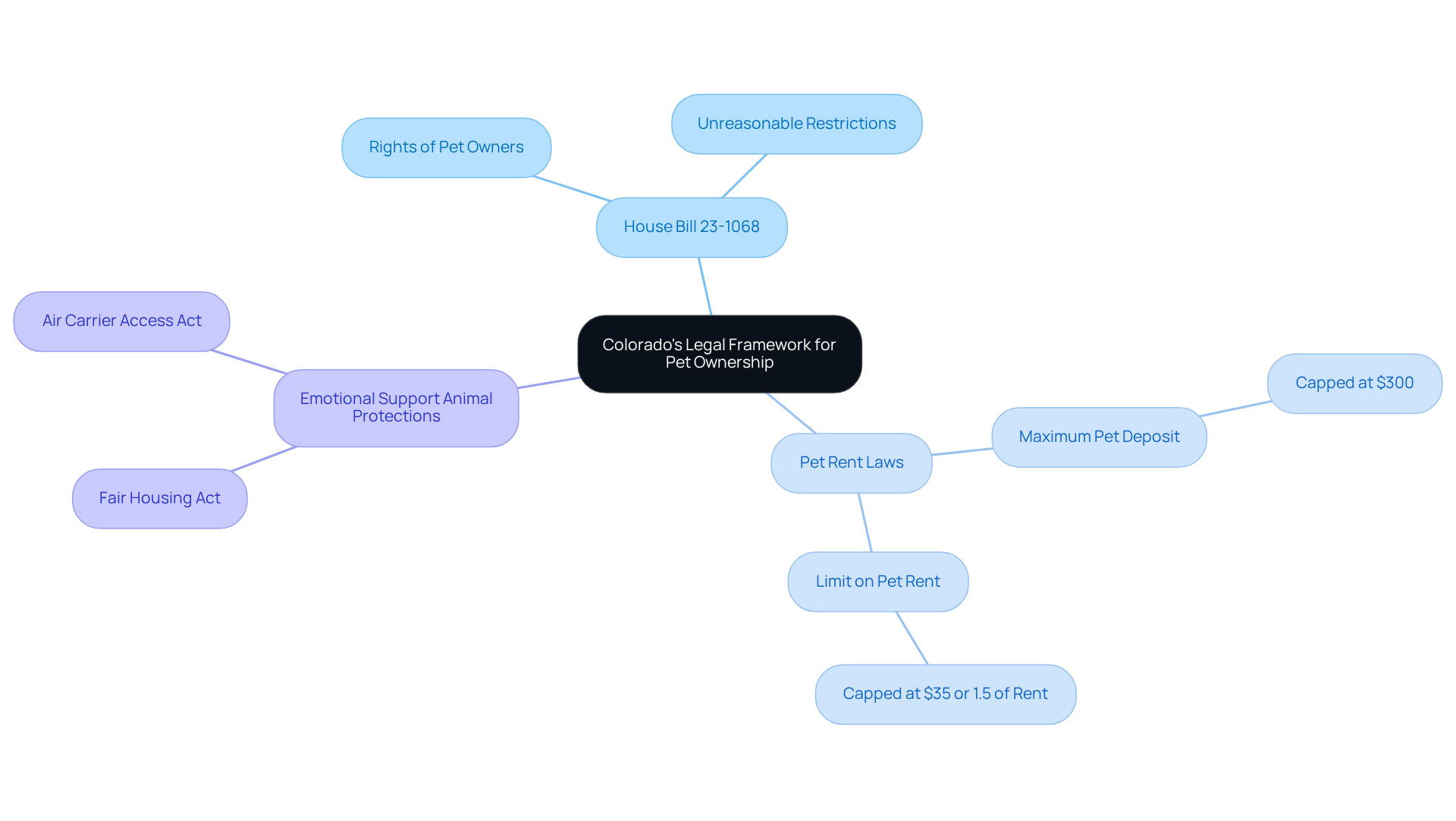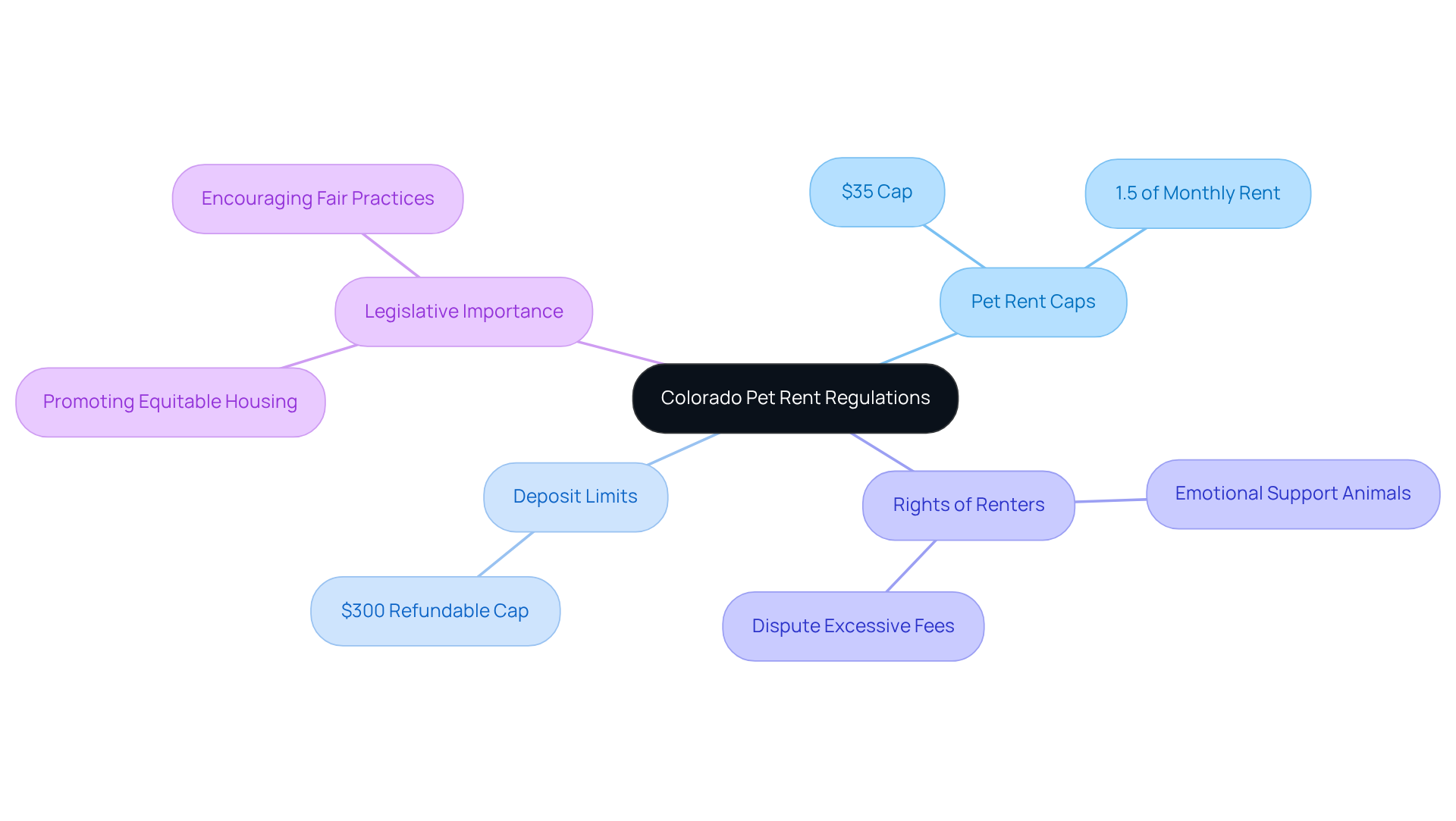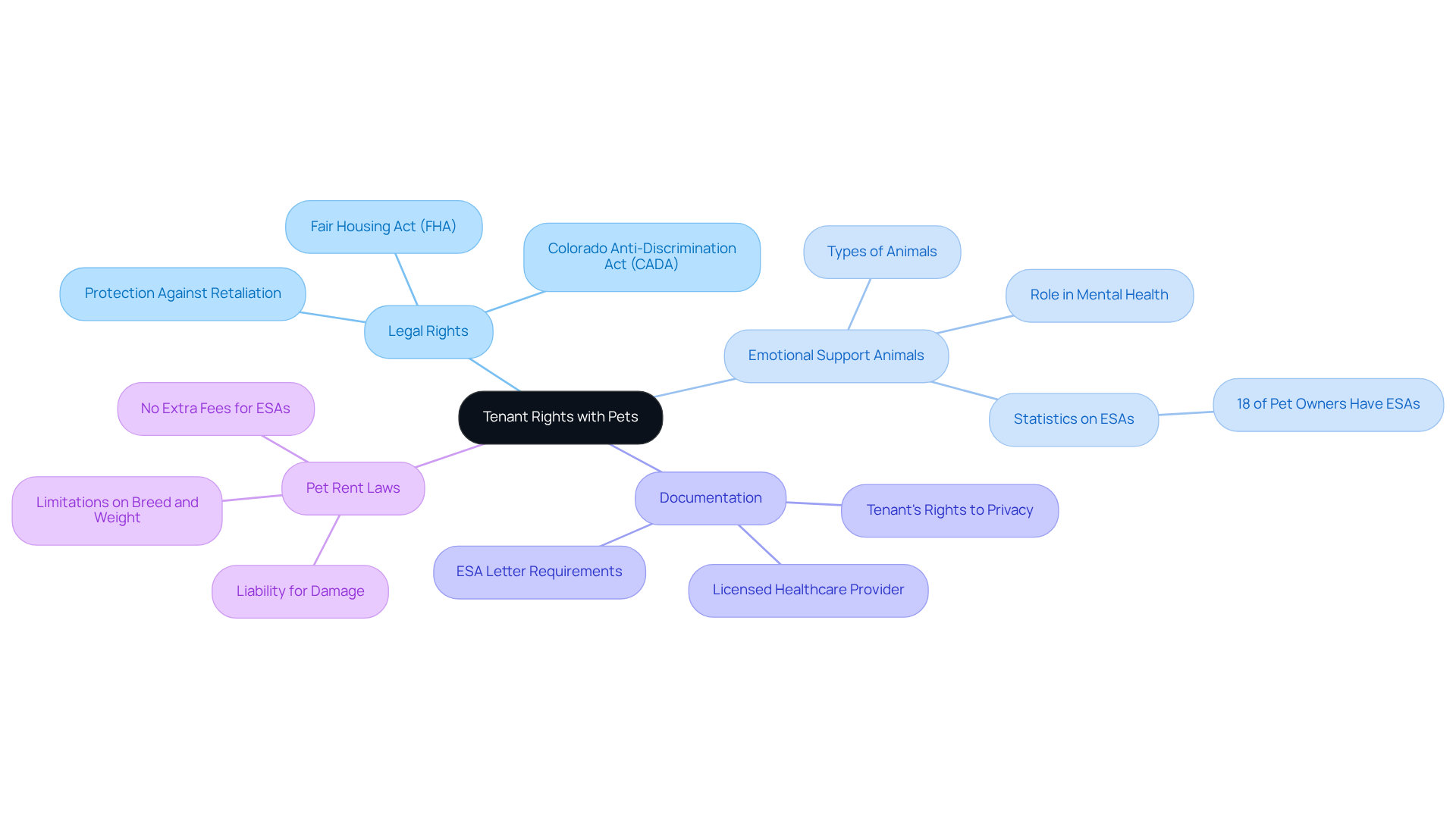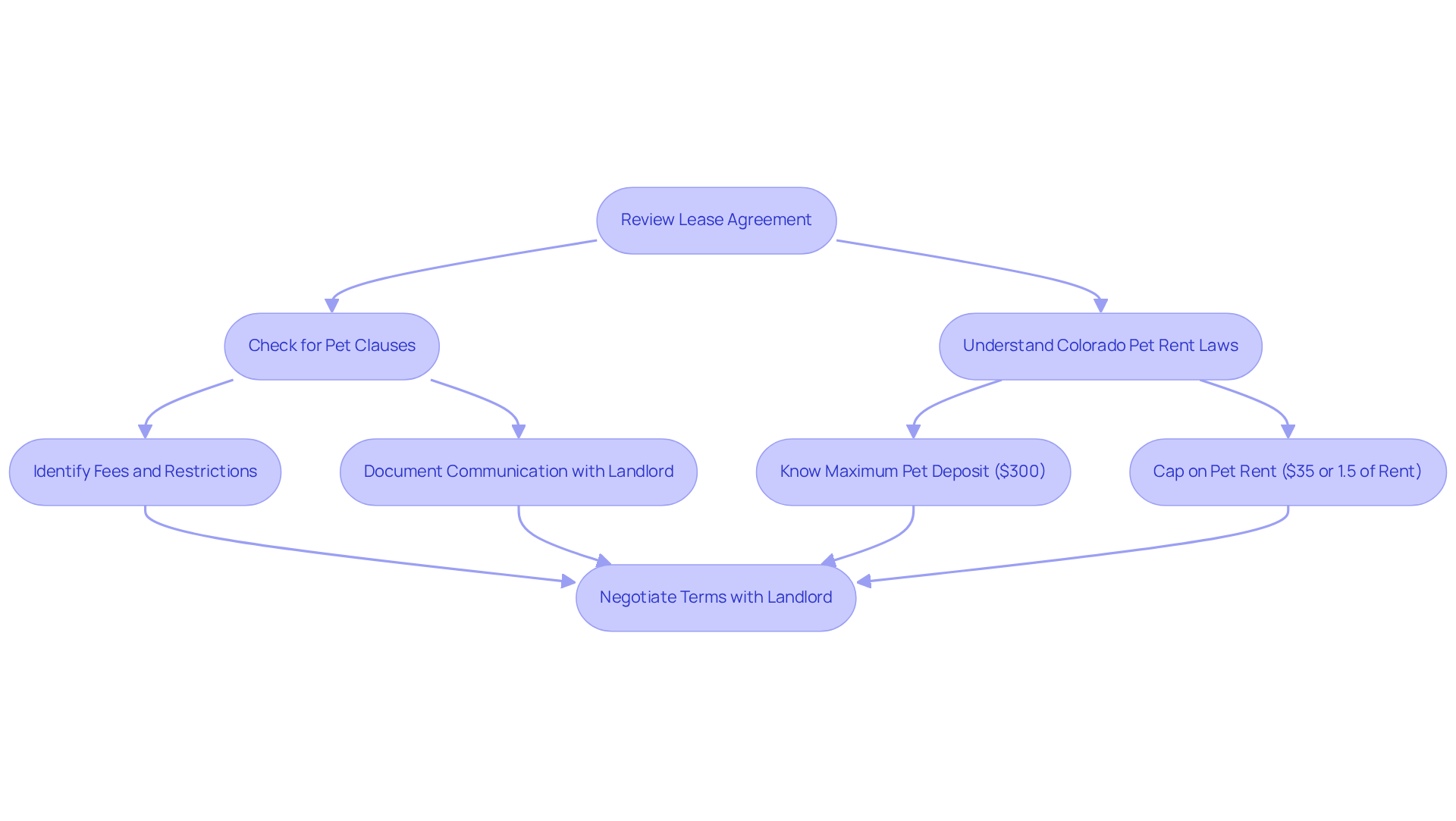

Navigate Colorado Pet Rent Laws: Essential Insights for Owners
by Lena Park
Last updated: August 27, 2025
Verified and Approved by:
Angela Morris,
MSW, LCSW
Fact Checked

Overview
This article seeks to illuminate Colorado’s pet rent laws, which play a vital role in safeguarding the interests of both renters and property owners. These regulations are particularly crucial for pet owners, especially those with emotional support animals who may face unique challenges.
By highlighting the significant elements of House Bill 23-1068, such as the limitations on pet deposits and rent, we aim to empower tenants to understand their rights better. It is essential to review lease agreements carefully to ensure compliance with these laws. This knowledge not only fosters a sense of security but also encourages individuals to advocate for their rights, reinforcing the importance of companionship in their lives.
Introduction
Navigating the intricacies of pet ownership in Colorado can often feel overwhelming, particularly for renters who deeply value the companionship of their furry friends. Recent legislative changes, such as House Bill 23-1068, have provided pet owners with clearer guidelines that protect their rights and promote fair treatment from landlords. Yet, despite these advancements, challenges remain. How can tenants effectively advocate for their emotional support animals without succumbing to unreasonable fees or restrictive policies? This article explores the essential insights surrounding Colorado’s pet rent laws, aiming to empower pet owners to understand their rights and navigate the complexities of lease agreements with confidence.
For many individuals, the emotional challenges tied to mental health can be profound. The presence of an emotional support animal (ESA) can offer a lifeline, providing comfort and companionship during difficult times. However, the path to securing the necessary support can be fraught with obstacles. It’s essential to recognize these struggles and the importance of having an ESA as a source of emotional stability.
Imagine the relief that comes from knowing your furry friend can be by your side, offering unconditional love and support. With the right ESA letter, pet owners can advocate for their needs effectively, ensuring that their emotional support animals are recognized and accommodated. This article aims to provide you with the knowledge and confidence to navigate these complexities, allowing you to focus on the bond you share with your beloved companion.
Explore Colorado’s Legal Framework for Pet Ownership
In Colorado, navigating the landscape of pet ownership can be challenging, especially for those who rely on their furry companions for emotional support. Understanding colorado pet rent laws is essential for pet owners facing potential hurdles, as the legal framework that governs this area is designed to protect both renters and property owners. One significant piece of legislation is House Bill 23-1068, which clearly outlines the rights of pet owners in rental properties. This law is a beacon of hope, as it reflects colorado pet rent laws by preventing landlords from imposing unreasonable restrictions on pet ownership and helping tenants retain their emotional support pets without the burden of excessive fees or deposits.
Specifically, the colorado pet rent laws establish a cap on pet deposits at a maximum of $300 per unit and limit pet rent to $35 per month or 1.5% of the monthly rent, whichever amount is higher. It’s important to note that any pet-related charges must be reasonable and clearly stated in the lease agreement, promoting transparency in rental practices. By understanding the colorado pet rent laws, pet owners can feel empowered to advocate for their rights and ensure that their emotional support companions remain by their side.
Moreover, the Fair Housing Act and the Air Carrier Access Act further bolster these protections, allowing individuals with emotional support animals to live and travel with their pets without facing discrimination. Familiarizing oneself with these regulations is crucial for effectively addressing housing issues, ensuring that pet owners can protect their rights and cherish the companionship of their beloved pets. Remember, you are not alone in this journey; support is available to help you navigate these challenges.

Understand Pet Rent Regulations and Requirements
Under Colorado pet rent laws, specifically House Bill 23-1068, landlords are subject to strict limits on pet-related charges, providing significant relief for many renters. Under Colorado pet rent laws, the law caps pet rent at $35 per month or 1.5% of the monthly rent, whichever is greater, while also limiting pet deposits to a maximum of $300, which must be refundable. The Colorado pet rent laws aim to make pet ownership more accessible and affordable for renters, particularly those with emotional support animals who often rely on the companionship of their pets for emotional well-being.
Pet owners should take the time to meticulously review their lease agreements to ensure compliance with these important regulations. It’s crucial that any additional fees or charges related to pets are explicitly stated in the lease. If a property owner tries to impose fees that surpass the limits established by Colorado pet rent laws, residents have the legal right to dispute these charges. Understanding the Colorado pet rent laws not only protects residents financially but also ensures their right to have emotional support animals, which can greatly enhance their quality of life and provide comfort during difficult times.
Recent discussions among Colorado legislators highlight the importance of Colorado pet rent laws in promoting equitable housing practices. For instance, the new Colorado pet rent laws prevent property owners from imposing excessive pet fees, reflecting a wider movement towards enhancing renter rights. As a result, landlords are encouraged to adopt fair practices that align with these legal standards, ensuring a more supportive environment for pet owners, who deserve to feel secure and valued in their homes.

Know Your Rights as a Tenant with Pets
In Colorado, residents face emotional challenges that can significantly impact their well-being. Fortunately, they have the right to maintain emotional support animals (ESAs) in their homes, regardless of any pet limitations outlined in their lease contracts. This means that landlords are legally required to accommodate ESAs, provided residents present valid documentation from a licensed mental health professional confirming the need for the animal. This essential documentation substantiates the resident’s claim and ensures adherence to the Fair Housing Act (FHA), which recognizes ESAs as a reasonable accommodation for individuals with mental health conditions.
ESAs play a vital role in supporting mental health, particularly for students in university housing, where they help alleviate symptoms related to psychological or emotional disorders. Imagine how comforting it is to have a furry friend by your side during stressful times. This support is crucial for promoting an equal opportunity to fully enjoy residential life.
It’s also important to know that Colorado pet rent laws protect renters from retaliatory actions by property owners when they assert their rights regarding pet ownership. If a renter submits a complaint or challenges an unreasonable pet policy, landlords cannot retaliate by evicting them or imposing increased rent. This legal safeguard empowers renters and fosters a supportive atmosphere for ESAs, which can greatly enhance the mental well-being of their owners.
Statistics suggest that roughly 18% of pet owners in the U.S. have emotional support companions, a figure that continues to grow as awareness of their mental health advantages expands. Successful claims by renters against pet restrictions often hinge on the proper documentation and understanding of Colorado pet rent laws. By being informed, tenants can navigate the complexities of housing regulations while ensuring their emotional support animals remain by their side. It’s a journey that not only enriches their lives but also reinforces the importance of knowing one’s rights in securing the necessary support.

Navigating Lease Agreements with Pet Clauses
Pet owners reviewing lease agreements in Colorado often face significant challenges, particularly regarding clauses related to pets. It’s important to carefully scrutinize these provisions to ensure they comply with state regulations. Starting January 1, 2024, property owners will be required to follow Colorado pet rent laws, which limit them to charging a refundable pet deposit of no more than $300 per pet, and cap pet rent at $35 per month or 1.5% of the monthly rent, whichever is greater. Renters must be aware of the specific wording surrounding these fees and any additional charges that may arise. Importantly, under the new laws, pets cannot be classified as personal property, which means property owners cannot place liens on them for unpaid rent. This change is a positive step forward, enhancing renters’ positions during negotiations.
If you find your lease contains ambiguous or overly restrictive pet provisions, remember that you have the power to negotiate these terms with your landlord. Open communication is key, especially when discussing the importance of emotional support animals and the legal protections they receive. This dialogue can foster a more positive landlord-tenant relationship. It’s also wise for tenants to document all communications regarding pet agreements, as this can be invaluable in resolving any disputes that may arise. There are many success stories of renters who have effectively altered pet provisions in their leases, highlighting the power of proactive negotiation. For example, one renter successfully negotiated a more favorable pet policy by clearly articulating their rights under the new regulations. By understanding your rights and the legal framework surrounding pet ownership, you can advocate for fair terms that improve your living situation while ensuring compliance with Colorado pet rent laws.

Conclusion
Understanding Colorado’s pet rent laws is vital for pet owners facing the complexities of rental agreements. These regulations not only protect tenants but also ensure that emotional support animals can remain an essential part of their lives, free from exorbitant fees or unfair restrictions. By familiarizing themselves with House Bill 23-1068 and other related laws, pet owners can advocate for their rights with confidence, fostering a stable living environment alongside their beloved companions.
This article highlights key aspects of Colorado’s pet rent laws, including:
- The cap on pet deposits
- Monthly pet rent
These promote transparency and fairness in rental practices. It underscores the importance of reviewing lease agreements to ensure compliance with these regulations and the legal protections available to tenants who assert their rights regarding emotional support animals. Furthermore, the discussion on the Fair Housing Act emphasizes the critical role these laws play in creating a supportive atmosphere for pet owners.
Ultimately, being informed and proactive is essential for pet owners in Colorado. By understanding their rights and the legal framework surrounding pet ownership, they can navigate potential challenges more effectively. This knowledge empowers individuals and fosters a more equitable housing landscape for all pet owners. Engaging with landlords and advocating for fair pet policies can lead to a more harmonious living situation, ensuring that both renters and their furry friends can thrive in their homes.
Frequently Asked Questions
What is the main purpose of Colorado’s pet rent laws?
The main purpose of Colorado’s pet rent laws is to protect the rights of pet owners in rental properties, ensuring they can keep their emotional support pets without facing unreasonable restrictions or excessive fees.
What does House Bill 23-1068 entail?
House Bill 23-1068 outlines the rights of pet owners in rental properties, preventing landlords from imposing unreasonable restrictions on pet ownership and helping tenants retain their emotional support pets without excessive fees or deposits.
What are the limits on pet deposits and pet rent in Colorado?
Colorado pet rent laws establish a cap on pet deposits at a maximum of $300 per unit and limit pet rent to $35 per month or 1.5% of the monthly rent, whichever amount is higher.
What must landlords do regarding pet-related charges?
Landlords must ensure that any pet-related charges are reasonable and clearly stated in the lease agreement, promoting transparency in rental practices.
How do the Fair Housing Act and the Air Carrier Access Act support pet owners?
The Fair Housing Act and the Air Carrier Access Act provide additional protections for individuals with emotional support animals, allowing them to live and travel with their pets without facing discrimination.
Why is it important for pet owners to understand Colorado’s pet rent laws?
Understanding Colorado’s pet rent laws empowers pet owners to advocate for their rights, ensuring they can keep their emotional support companions and navigate potential housing challenges effectively.
Certify Your Emotional Support Animal Today

Why You Can Rely on Us?
At Wellness Wag, we believe your pet deserves care rooted in both science and compassion. Each article is carefully researched, written in clear language for pet owners, and then reviewed by qualified professionals to ensure the information is evidence-based, current, and practical for real-life care. Our goal is to help you feel confident in making informed decisions about your pet’s health and well-being.
Reviewed by
Angela Morris, MSW, LCSW
Angela is a licensed clinical social worker with 20 years of experience in patient advocacy and community mental health. She has assisted numerous clients with ESA evaluations and brings a deep understanding of disability accommodations, ensuring that all information is accurate, supportive, and practical.

Written by :
Lena Park
Last Updated :
August 27, 2025












